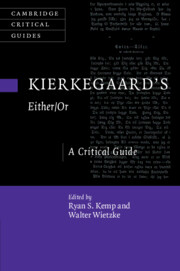Book contents
- Kierkegaard’s Either/Or
- Cambridge Critical Guides
- Kierkegaard’s Either/Or
- Copyright page
- Contents
- Contributors
- Acknowledgments
- Abbreviations
- Introduction
- Chapter 1 Existential Melancholia
- Chapter 2 Don Giovanni and the Musical-Erotic
- Chapter 3 For What May the Aesthete Hope?
- Chapter 4 Companions in Guilt
- Chapter 5 A’s Religion of Boredom
- Chapter 6 The Artist Is Not Present
- Chapter 7 Failed Temporalities in Either/Or
- Chapter 8 Love, Marriage, and Delusion in Either/Or
- Chapter 9 The Philosophy of Science in Either/Or
- Chapter 10 The Despair of Judge William
- Chapter 11 The Problem of Evil in Either/Or
- Chapter 12 Illusions of Ethical Independence
- References
- Index
- Cambridge Critical Guides
Chapter 3 - For What May the Aesthete Hope?
Focus and Standstill in “The Unhappiest One” and “Rotation of Crops”
Published online by Cambridge University Press: 16 November 2023
- Kierkegaard’s Either/Or
- Cambridge Critical Guides
- Kierkegaard’s Either/Or
- Copyright page
- Contents
- Contributors
- Acknowledgments
- Abbreviations
- Introduction
- Chapter 1 Existential Melancholia
- Chapter 2 Don Giovanni and the Musical-Erotic
- Chapter 3 For What May the Aesthete Hope?
- Chapter 4 Companions in Guilt
- Chapter 5 A’s Religion of Boredom
- Chapter 6 The Artist Is Not Present
- Chapter 7 Failed Temporalities in Either/Or
- Chapter 8 Love, Marriage, and Delusion in Either/Or
- Chapter 9 The Philosophy of Science in Either/Or
- Chapter 10 The Despair of Judge William
- Chapter 11 The Problem of Evil in Either/Or
- Chapter 12 Illusions of Ethical Independence
- References
- Index
- Cambridge Critical Guides
Summary
In this chapter, we argue that a distinct concept of “aesthetic hope” emerges from the way Kierkegaard’s Aesthete treats hope [Haab] and its relationship to recollection [Erindring] in “The Unhappiest One” and “Rotation of Crops.” We first show that aesthetic hope is distinct from the two other kinds of hope discussed by Kierkegaard: temporal hope and eternal hope. We then consider the suggestion that aesthetic hope is also an expression of despair – an inverse hope against hope, which seeks to avoid disappointment by hoping for things that are in some sense certain. The aesthete’s recommendation that we hope in such a way illuminates Kierkegaard’s view of the “dialectic” of temporal hope and eternal hope. Finally, we explore the treatment of hope in Either/Or as essentially involving a controlled, attentional element that anticipates some contemporary trends in the philosophy of hope.
- Type
- Chapter
- Information
- Kierkegaard's Either/OrA Critical Guide, pp. 42 - 61Publisher: Cambridge University PressPrint publication year: 2023

